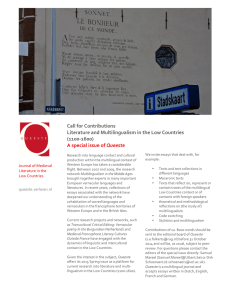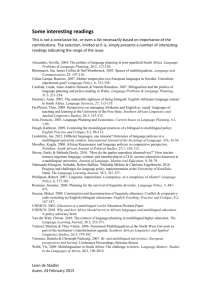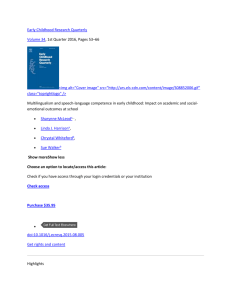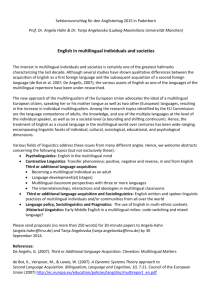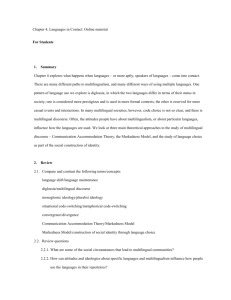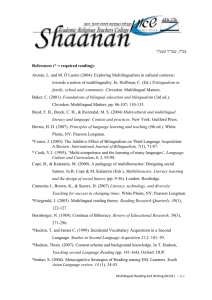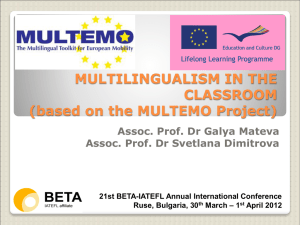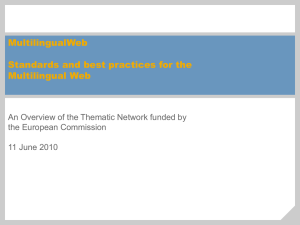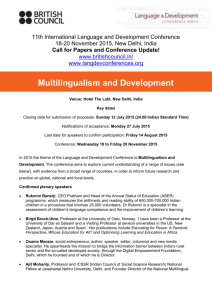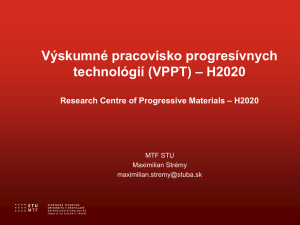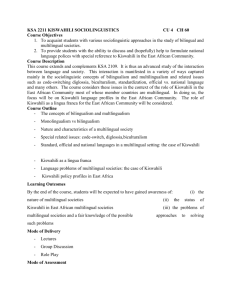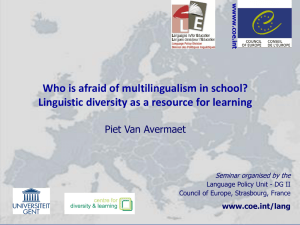Developing multilingual research practice for new times: a challenge
advertisement
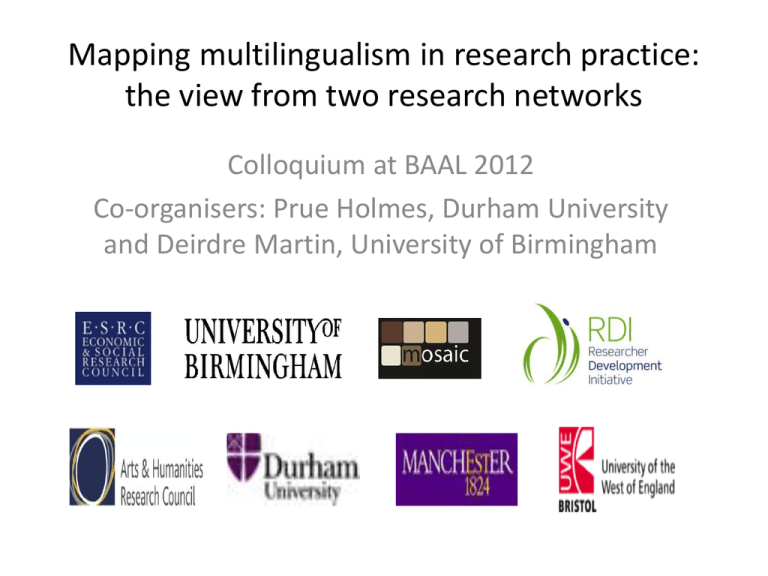
Mapping multilingualism in research practice: the view from two research networks Colloquium at BAAL 2012 Co-organisers: Prue Holmes, Durham University and Deirdre Martin, University of Birmingham Project based at the MOSAIC Centre for Research on Multilingualism, University of Birmingham Researching multilingualism, multilingualism in research practice Funded by the Economic and Social Research Council (ESRC) 2010-2013, as part of its Researcher Development Initiative (Round 4) www.birmingham.ac.uk/research/activity/education/mosaic/index.aspx Project team: Deirdre Martin (PI), Marilyn MartinJones, Adrian Blackledge & Angela Creese Project based at Universities of the West of England (UWE), Durham and Manchester Researching multilingually Funded by the Arts and Humanities Research Council (AHRC), as part of its Translating Cultures programme, 2011 – 2012. http://researchingmultilingually.com Project team: Prue Holmes (PI) and Mariam Attia (Durham); Richard Fay (Manchester) and Jane Andrews (UWE) Developing multilingual research practice for new times: a challenge to the status quo Jane Andrews, UWE and Marilyn Martin-Jones, MOSAIC, University of Birmingham Outline • An established, field-specific tradition of multilingual practice • Epistemological & methodological advantages accruing from reflexive multilingual practice • New times, new mobilities, new multilingualisms • Globalisation of research worlds: different groups of researchers • Multilingual research practice & the lone doctoral researcher: opportunities & constraints An established, field-specific tradition of multilingual research practice • Located within the field of multilingualism • Developed through sociolinguistic and ethnographic research over two decades (early 1990s to the present) • Characterised by considerable reflexivity Some examples Reflection on: • The challenges and pitfalls of research with interpreters (Martin et al., 2004; Andrews, 2012) • The nature and scope of ethnography in multilingual settings (Heller, 2006; 2008) • Researcher positioning in the field (Giampapa, 2012; Jonsson 2012; Muhonnen, 2012) • The development of dialogic approaches to multilingual literacy research (Jones, Martin-Jones and Bhatt, 2000) • Research in multilingual teams (Creese et al. 2008; Blackledge and Creese, 2010) Epistemological & methodological advantages accruing from reflexive multilingual practice A deepening of our understanding of the ways in which spoken & written language mediates: • The negotiation of insider-outsider identities and researcher positioning • The representation of research participants (their practices, beliefs & values) in research narratives • Processes of knowledge exchange Epistemological & methodological advantages accruing from reflexive multilingual practice A growing awareness of: • How attention to the detail of multilingual practice can make knowledge construction more transparent (e.g. analysis of language alternation in interviews) • How the interpretive processes involved in transcription, transliteration and/or analysis of multilingual data can be made more visible • How different voices can be incorporated into research narratives (e.g. those of participants or different members of a multilingual team) Research collaboration and multilingual research teams Greater acknowledgement of: 1. The ways in which bilingual researchers are positioned within the academy and within research projects and how this positioning can be challenged 2. The need to take account of how researchers’ communicative repertoires & language and literacy resources are shaped by their own histories and educational trajectories 3. The need to be aware of the implications of 1 and 2 at different stages of the research process New times, new mobilities, new multilingualisms • Globalisation and new mobilities – movement of people, circulation of goods, texts, images, ideas, discourses etc. • Increased visibility of multilingualism e.g. in linguistic landscapes of cities, on the internet, in new media • Increased exploration of new multilingual ways of engaging in research & development of new conceptual compasses (e.g ‘Trajectories’ Heller, 2011; ‘Mobile resources’ Blommaert, 2010) Globalisation of research worlds • Internationalisation policies of universities • Increased transnational flow of students and greater mobility for doctoral researchers • Increased border-crossing among post doctoral researchers, seeking employment • Internationalisation of research - transnational research collaborations • Internationalisation policies of funding bodies: EU, HERA, ESF, UNESCO, ESRC Multilingual researchers in a global age: different groups, resources, opportunities and constraints • Lone doctoral researchers • Early years post-doctoral researchers -Appointed to funded research projects -Independent researchers • Members of research teams that have been constituted transnationally (See handout for discussion) New dimensions of multilingual research practice (opportunities & constraints) See handout for examples Institutional constraints • The monolingual regime established in most universities, funding bodies and companies producing software for academic research • The current practices and regulations of universities and the growing audit culture (e.g. research ethics procedures, supervision records) • University library resources and documentation practices • The demands of the globalised publishing industry Concluding remarks: a varied picture • Constraints on multilingual research practice vary across institutions, across fields of research, disciplines and paradigms • The symbolic & regulatory power of institutions is not fixed or monolithic: it is always possible to create spaces for alternative ways of working and for different voices to be heard. • Creating these spaces depends on the agency of individual researchers, thesis supervisors, principal investigators on research projects, university librarians and publishers.
